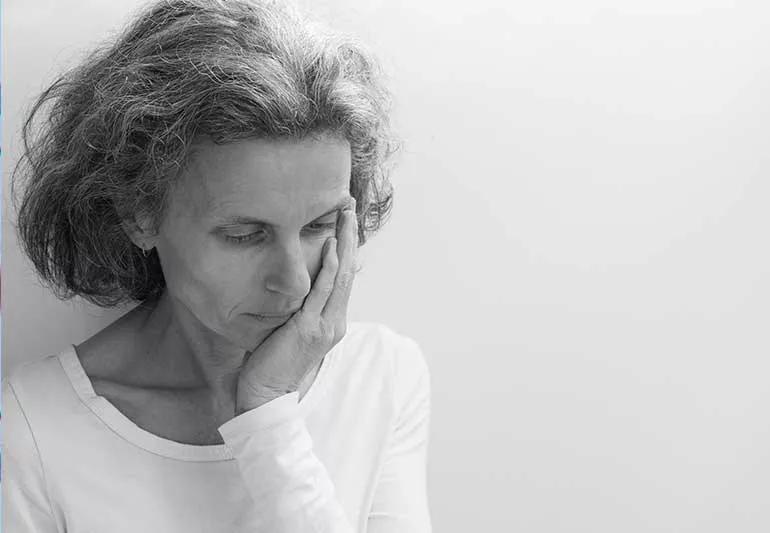Americans aged 65+ are at much higher risk for completing suicide than other demographics

Aging is a privilege that not everyone gets to experience — but it also comes with unique stressors that can put your physical and mental health at risk. As of fall 2022, adults over age 65 accounted for almost 17% of all suicides in the U.S., despite making up just 12% of the population.
Advertisement
Cleveland Clinic is a non-profit academic medical center. Advertising on our site helps support our mission. We do not endorse non-Cleveland Clinic products or services. Policy
Geriatric psychiatrist John Sanitato, MD, explains the unique risk factors that put older adults at risk for suicide and mental health concerns — plus, how you can best be there for the people you love as they age.
Adults age 65+ are at much higher risk for completing suicide than adolescents and teens. One in 200 youth who attempt suicide complete it, compared to 1 in 4 older adults.
“When you think about the older adult population, the big concern is loss,” Dr. Sanitato says. “There can be a loss of function, cognition, peer group, financial stability and general well-being.”
He delves deeper into these risk factors and how they impact older people in particular.
The U.S. Centers for Disease Control (CDC) estimates that 46% percent of people who die by suicide have been diagnosed with a mental health condition like depression. But the real number is likely higher, as that estimate doesn’t account for people whose mental illness goes undiagnosed.
With aging comes increased health issues, which can be a major contributor to depression and suicidal ideation. “A decline in physical health, whether it’s loss of organ function or increasing pain, is a risk factor,” Dr. Sanitato says.
And brain health is a major factor, too. “People with cognitive impairment and dementia are at greater risk for both attempting and completing suicide,” Dr. Sanitato adds. One study found that people under 65 who have been diagnosed with dementia are nearly twice as likely to die by suicide than people without a dementia diagnosis.
Advertisement
The older you get, the more likely you are to experience multiple losses, including spouses, parents, siblings and peers. The grief of those losses can contribute to depression, loneliness and fear of aging.
Losing a spouse is a common stressor among older adults. “Couples, especially those who have been together for many years, often operate as one,” Dr. Sanitato notes. “When one of them dies, it can be really, really difficult for the other one to figure out where to go from there.”
Leaving a job that once left someone feeling fulfilled and productive can be a major mental and emotional stressor.
One Canadian study found that the first month after retirement is a critical time for teaching people how to adapt to their new lifestyle. Similarly, an Australian study reported that services designed to help new retirees transition out of employment could help lessen the risk of suicidality.
Money troubles and food instability can both contribute to depression, anxiety and thoughts of suicide.
A 2022 study of adults 50+ in five low- and middle-income countries found that older adults experiencing moderate food insecurity were 2.59 times more likely to attempt suicide than their food-secure peers. Older adults experiencing severe food insecurity were 5.15 times more likely.
All of the above factors can play a role in increased feelings of loneliness and isolation in older adults.
“Loneliness has become a buzzword,” Dr. Sanitato says, “and study after study now shows how important it is for older adults to stay connected.”
Loneliness has been shown to increase people’s risk for self-harming behaviors and suicide — and for men who live alone, the risk is highest.
In general, white men are at the highest risk for suicide, accounting for nearly 70% of all suicides in 2020. And white men over age 65 are at the greatest risk.
“They’re the demographic that is most likely to complete suicide,” Dr. Sanitato states. “Let’s say someone has been married for 40 years, and his wife primarily managed their household. Now that she’s died, he’s left to his own devices, and he’s lost without her.
“I know that sounds like a stereotype — but it’s borne out by the statistics.”
And there’s an added complication. Because people in this demographic are so likely to complete suicide, there’s not always an opportunity to intervene. “We’re not as likely to see them in the emergency room or in the hospital for help,” Dr. Sanitato adds.
In many cases, Dr. Sanitato points out that suicide is preventable — and we all have a role to play in understanding and noticing the warning signs. So, what can you do to keep an eye on your loved ones as they age?
Advertisement
There used to be a widely held belief that asking someone if they were thinking about suicide could drive them to attempt suicide. But that has been debunked time and time again.
Dr. Sanitato says the best approach is to ask your loved one directly.
“If you have any concern, you should always ask, ‘Are you thinking about suicide? Have you had thoughts about suicide?’” he advises. “It’s also a way to make sure that they know that you’re there for them and that you care.”
And it’s OK to keep asking.
“Even if you asked once, follow up on it and ask again,” Dr. Sanitato urges. “They will continue to know that somebody is interested and that somebody cares about them — and sometimes, that can be enough.”
Though suicide can impact people of any race, sex, ethnicity and age, warning signs don’t always look the same.
“Depression in older adults doesn’t always look like it does in younger people,” he says. “You might think of depression as obvious sadness, always seeming downcast and teary — but in older adults, it more often looks like withdrawing or being dismissive, sort of a ‘What’s the use?’ attitude.”
Look for:
Advertisement
Many of these things aren’t problematic on their own, Dr. Sanitato says. For example, older adults often update their will, set up a healthcare power of attorney and make plans for what will happen to their money or their belongings after they’ve died — and doing so isn’t inherently a sign of suicide risk.
But when these warning signs come in combination, they may signify trouble.
“We often see these things happening concurrently,” Dr. Sanitato states. “Someone starts avoiding friends, blowing off appointments, neglecting to wash their hair — when it all comes in tandem, that’s a concern.”
“Take seriously any sudden preoccupation with mortality and the end of life,” Dr. Sanitato stresses. Pay attention when someone says they:
If someone you care about tells you they’re considering suicide, or if you notice these warning signs and are concerned, don’t wait.
Contact the 988 Suicide & Crisis Lifeline through chat, text or a phone call without delay. This national network offers free and confidential help to people who are contemplating suicide, as well as to their loved ones.
Advertisement
And don’t hesitate to take your loved one to the emergency department if you have immediate concerns for their safety. “Try to be with the person, if you can, and call the authorities if you need to,” Dr. Sanitato advises. “You always want to err on the side of caution.”
Learn more about our editorial process.
Advertisement

Dialing 988 connects you to a network of counselors who can offer support you need

Let kids know it’s OK to get help for mental health

Your tolerance decreases with age, thanks to body changes, health conditions and medications you may take

Autism and OCD often co-occur, but distinguishing between them is crucial for successful treatment

These intrusive thoughts are common and fleeting, and aren’t often a cause for concern, unless you have other mental health symptoms

BPD is associated with more frequent mood swings and difficult relationships, while bipolar disorder has more persistent, long-lasting depressive and manic episodes

It’s common to experience long-term emotional effects, but you don’t have to cope alone — support and treatment can help

Major life events and trying times can trigger reactive depression symptoms, like prolonged sadness, irritability and hopelessness

Start having sex about 72 hours before ovulation, then at least every other day during your fertile window

Attachment theory suggests that your earliest relationships shape connections throughout your life

It isn’t a recognized mental health disorder, but research shows that problematic social media use can negatively affect your mental health, self-esteem and sleep